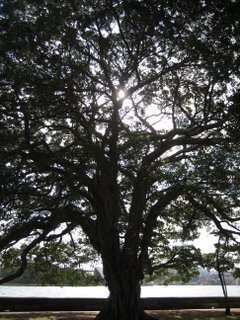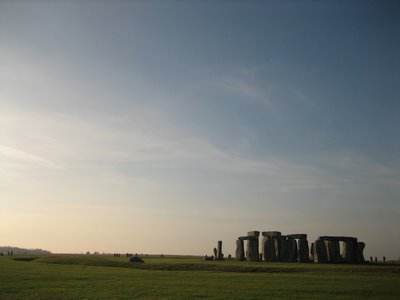How green is God? A reply to Lionel Windsor
I've just come across a talk written by Lionel Windsor, whom I know and respect from my MTC days. It was published at some stage in the last 12 months by AFES's SALT Magazine under the title, "Is God green?". It can be found in five parts: #1, #2a, #2b, #3a, #3b. Having recently written a similar kind of piece for the same publication, it was interesting to note how much overlap our pieces had. His was longer, more conversational and an easier read but I'd say we agree on about 90% of the theological and ethical content.
We agree on the goodness of creation distinct from human usefulness, on the depth of human sinfulness and its effects on ecological health,* on the distinction between treating symptoms and treating the underlying disease, on the centrality of Christ and his death and resurrection for any theological discussion of treating this disease, on the universal (not merely human) scope of Christ's redemptive action, on the church as the first fruits of a redeemed humanity, on the anticipatory nature of Christian discipleship, on the impossibility of our actions "saving the world", on the significance of eschatology and God's future judgement and renewal in ecological ethics, on the aptness of yearning and active waiting, on the endurance of love and the passing away of the present form of the world,** on the cruciality of gospel proclamation and probably on much else as well.
*I think his analysis of the links between ecological destruction and human sin could be extended into social structures that give our greed, pride, apathy and so on extra momentum, and make some of these issues "built in" to the way we collectively and habitually do things.
**I would phrase certain sections of his talk quite differently and also emphasize the continuity of the resurrected body with the corpse - that it is this body that is resurrected and transformed, not some replacement for it - and so also expect a measure of continuity between the renewed creation and the old. Though since Lionel is happy to speak of creation being perfected and makes reference to Paul's seed analogy in 1 Corinthians 15, I don't think we're really too far apart here.
Our differences (such as I can discern from a single article and I apologise if I've misread him) seem to revolve around two issues. First: the relationship of ecological catastrophe to divine judgement. Lionel says,
"[T]he judgement day will not come before God is ready. So if you think that the human race will wipe itself off the face of the map through environmental disasters, then that is actually an arrogant attitude. Final judgement is God's job. Right now, God is keeping the world until he is ready to judge. We can’t wipe ourselves out because God will not let that happen until he is ready to judge us!"He seems to imply that divine judgement is limited purely to the final judgement, whereas I think that the unveiling of God's wrath against human folly is already evident today in our being handed over to the consequences of our own greed and stupidity as discussed in Romans 1. Thus, ecological catastrophe can already be understood as manifestation of God's judgement in allowing us to experience the destructive effects of our search for invulnerability. We taste our own medicine and find that it is poison; we have to lie in the bed we have made. So, Lionel's contrasting of ecological catastrophes with divine judgement in order to avoid misunderstanding of eschatological judgement masks their present connection. I suspect, however, he may well be entirely happy with this nuance.*
*UPDATE Lionel has clarified that he was here only referring to final judgement and quite rightly pointed out that he discusses my concern in part 2a. My apologies for not re-checking my point.
But there is a further claim being made here, even about the day of eschatological judgement, namely, that human actions will have no part in bringing it about (even inadvertently). To my mind, the fact that the timing of the day of judgement is in the hands of God and so is hidden from human knowledge (two common scriptural themes) doesn't necessarily mean that God might not use human instruments in bringing about an end to human history. God's actions are frequently mediated by imminent agents and the images used of ultimate judgement are, I take it, largely metaphorical, such that its actual shape is not known in advance, only its inevitability and decisiveness (amongst other things). But Lionel seems to see final judgement as God's exclusive prerogative without any human instrumentality (apart from Christ the judge, of course).
And this means that Lionel is confident that, try as we might, we can't wipe ourselves out. I am not so sure. Certainly, we can so damage the living systems on which we thoroughly rely that our civilisation and way of life falls apart (whether quickly or slowly). Indeed, we can do this through the speedier nuclear option as well as the slightly delayed ecological route. Can we entirely "wipe ourselves out", presumably meaning the extinction of the human race as a whole? At a practical level, I don't see that it beyond our present power and theologically I see no promises that this cannot happen. This doesn't mean we thereby escape judgement, or that all hope is lost, because even if we entirely destroy ourselves, God can raise the dead. Suicide is no way out, either individually or collectively. The closest I think we see to a scriptural expectation of humanity's continued existence until final judgement is Paul's comment in 1 Corinthians 15 that "we shall not all sleep, though we shall all be changed" (a comment also applicable to babies, by the way). However, even this is not decisive as I think Paul's point is that death is not a necessary route to the kind of transformation of which he speaks. That Paul does not mention the possibility of the self-destruction of the entire human race may have more to do with a pre-industrial imagination not yet shaped by the staggering increase in human agency that has come in the modern era than with a divine promise of the imperishability of our species.
But the point is a minor one, and I don't place much weight on it. It is enough that we certainly have the power to wound ourselves grievously, to decimate the possibility of life on earth and shatter or erode the conditions under which our society is possible. And while these may not have ultimate significance, their penultimate import is weighty indeed.
The second, and I suspect more important, difference concerns the relation of the good to the best, or of deeds of love with words of love. Lionel paints a moving picture of composting out of love for neighbour, or even lobbying the G8 for the same reason. But then he places such activity in direct competition with "speaking the word of the Lord to others", and implies that doing one means the inability to do the other. They are competitors to my limited time and energy:
"But what is the greatest labour in the Lord? Compost heaps take time. Lobbying G8 leaders takes even more time. And we don’t have an unlimited time here on earth. Sure, these are good ideas, but how do I decide what is the most urgent thing? The primary, the greatest labour in the Lord? Isn't it to speak the word of the Lord to others? Isn't it to share Jesus with your friends and family?"But I say, why either/or? Why not both-and? The good need not be the enemy of the best. The promotion of the gospel is not a zero sum game between words and deeds. Both are necessary; neither is sufficient. There is no conflict between loving God and his word of life for all and loving my neighbour in a dying world.
And so, despite much in common, I suspect that Lionel and I end up with somewhat different estimations of the place of ecological responsibility in Christian discipleship. My subheading was of course tongue in cheek, as though it were a matter of competition. But the differences between us are nonetheless of (penultimate) importance, since Christians have too often been too quick to sidestep the gospel invitation to love our ecological neighbours, or to relegate such matters to mere optional extras.
With these points mentioned, I warmly recommend you read his piece as a cogent introduction to an evangelical ecological theology.














